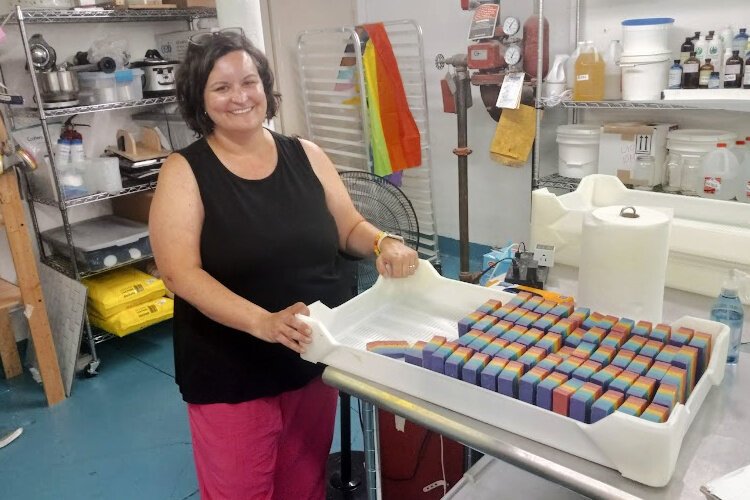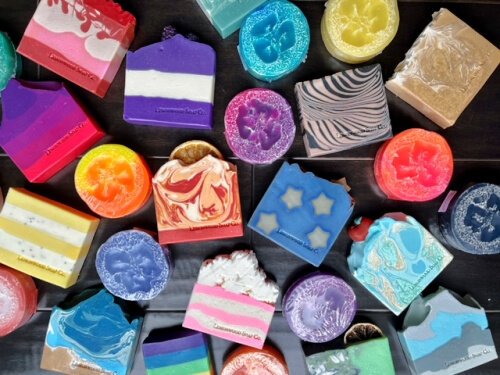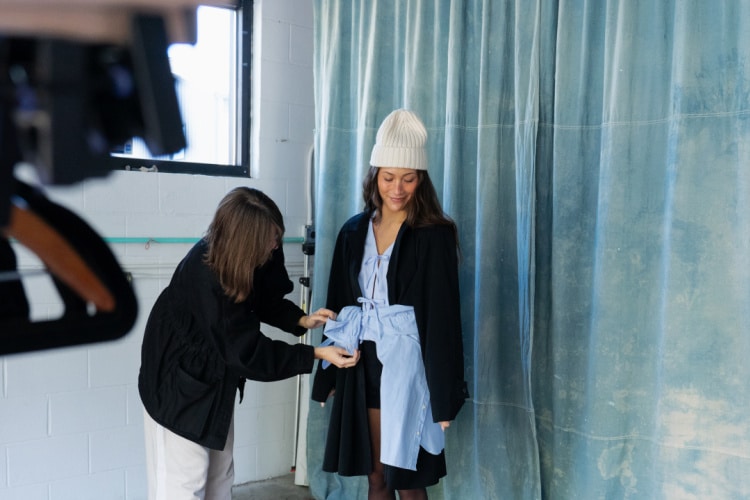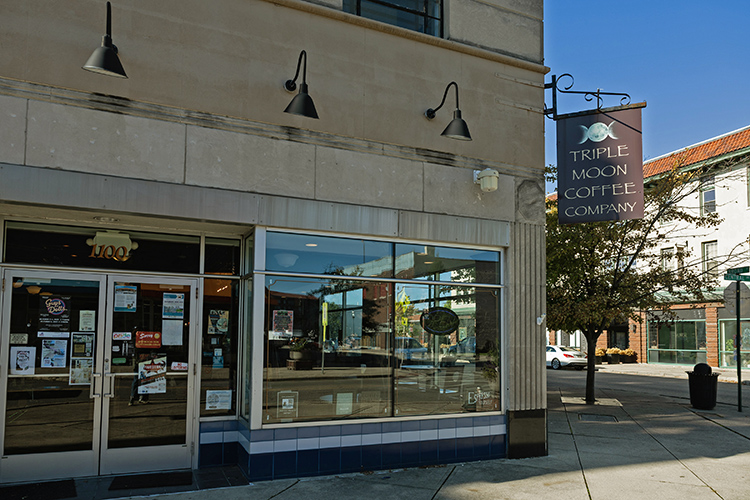Soap making is good, clean fun and good business too
Two local soap makers provide insight into how they create fragrant, long-lasting bars of soap and what drives their professional passions.

In the post-COVID aftermath, the rapid rise of small businesses and entrepreneurialism has yielded positive outcomes. According to Forbes, the U.S. Census Bureau reported 16 million new businesses since the start of the Biden/Harris Administration, an 85% increase in the monthly rate from 2004 through January 2021. Further, the average of approximately 440,000 new businesses established monthly is 46% higher than the 2017-2020 period.
Female-owned businesses have been the primary driver of small-business growth, with the growth rate of businesses created by women 94% greater than those launched by men. The reasons for the explosive growth of new, small enterprises are many, but the desire to connect more deeply with neighbors and communities has caused many to rethink how they purchase household items.
Locally sourced goods may be financially impractical for many consumers, but basic household staples provide a better venue for supporting these small businesses. Soaps are a prime example. There’s not only a plethora of such small businesses in your community, but the products they sell also contain naturally derived ingredients instead of problematic ingredients in mass-market commercial soaps (sorry, P&G).
Two local soap makers provide insights into their processes to create fragrant, long-lasting bars of soap and other bath products, and what compels their professional passions.
Oakley Soap Co.
Laura Pipitone, an Oakley resident for a decade, founded her business, The Oakley Soap Co., in 2017. She’s long been an avid baker, and her appreciation for precise, methodical use of ingredients and a more natural alternative to what’s on store shelves led to her experiment with a lemongrass soap making kit. She liked the results, and decided to delve into opening her own business. She invested in a stick blender and started buying mass quantities of lye, olive oil, mica, scented oils, and other essential ingredients for soapmaking.
For the first five years, she worked out of the basement of her home, but her business grew such that she needed a larger production space. Through a friend, she learned about a vacancy at the Columbia Center (aka the Junior League Building) at Columbia Parkway and Delta Avenue. The windowless space simplifies climate control – low humidity helps the curing process – and other Columbia Center occupants enjoy free aromatherapy. As soon as you walk down the steps toward her studio, olfactory evidence reveals Laura’s line of work.
Patience and planning are virtues when making soap. To make long-lasting soap using the cold process (see the sidebar for an explanaton of the hot vs. cold process) requires six weeks to fully cure. And although lye is the core ingredient in soap, it’s highly alkaline and irritating to the skin if not sufficiently diluted with essential oils and distilled water (tap water’s high mineral content leads to impurities that can discolor soap). To give her soaps their distinctive hues and designs, Laura uses mica and an array of pigments.
She produces an average of 300 bars per month, and business accelerates to approximately 600 per month during the holiday season (production will begin in August for Yuletide products). Laura’s business has grown to include complementary offerings such as sugar scrubs for skin exfoliation, shower steamers for bathroom aromatherapy, and shampoo bars as alternatives to liquid hair-care products.
She estimates that 60% of her products sell online, 30% at independent markets, and 10% wholesale through specialty retailers. Her favorite market to sell her wares is City Flea, a once-a-month open-air market in Washington Park from April through November. She also has shelf space at The Collective in Columbia Tusculum.
In honor of Pride Month, Laura produced three special-edition bars: rainbow-colored lemongrass, a red, white, and blue bergamot and lime, and red, yellow, and blue raspberry lemonade. A portion of the sale of each Pride bar is donated to Transform, which provides free clothing, style assistance, and other support and resources for trans and nonbinary kids and teens.
Reflecting on her soap making tenure, Laura said, “I didn’t think I would enjoy running my own business this much. I’m proud to do my own thing, and it’s definitely helped me as a mother of two with my quality of life.”
Lemonwood Soap Co.
Crystal Guffey and her husband, Steve, operate Lemonwood Soap Co., which began as a business nine years ago and is now a freestanding store that opened two years ago in Waynesville. Crystal first learned about soap making in her late teen years from her grandmother, although grandma’s recipe was the harsh, old-school, lye-and-animal fat version that’s great for counteracting poison ivy but as irritating to skin as sandpaper.
A retired science teacher taught Crystal how to make soaps that are more colorful, fragrant, and gentle. First eager to adopt a new hobby, she made a batch with oatmeal, milk, and honey. It was successful and helped inspire a new career.
She said that some soap makers are very protective of their recipes, but noted that most recipes share many similarities, and that personal preference drives many ingredient choices.

A color sampling of Lemonwoods Soap’s bars, which Crystal and Steve Guffey have produced for nine years.
“I’m a little bit of a people-pleaser by nature, so it’s instinctive for me to listen to customer suggestions,” Crystal said. “But I’ve learned from experience that sometimes following suggestions leads to a poor product.” She continued, “I have some opinions that go against the grain. For example, I don’t think moisturizers are that important in soaps. A soap’s main function is to cleanse. Also, goat’s milk soaps have become very popular, but I don’t think they are as gentle and moisturizing as some claim. Maybe for certain skin types.”
To help oily skin, Crystal said that activated charcoal is a helpful soap additive, and for soaps designed for sensitive skin, a simplifying ingredient list and reducing the proportion of lye in the recipe is key. She also typically opts for natural fragrances instead of essential oils.
“Essential oils have a lot of complex properties, to where they’re almost medicinal in nature,” she said. “I think people need to learn about what they do, and it’s hard to include that with a bar of soap.”
Crystal sells approximately 5,000 bars a year, as well as bath bombs, lotions, lip balms, and body scrubs. Since opening Lemonwood’s brick-and-mortar store, they’ve reduced the number of markets where they sell. The Holiday Market at the Duke Energy Center has been a major sales boon, but the Market won’t happen this November because of the Center’s renovation. Lemonwood operates a booth at the Pride Parade, and they sell at some handmade-product stores, and at Alba Hair Salon in Oakley.
Crystal said that a natural-ingredient soap should be considered like fine wine: “When a bar has been sitting on the shelf for a long time, some of its water content will have evaporated, so the soap’s active ingredients will be more concentrated and effective. Its color and scent may fade a bit, but the soap will work very well.”














